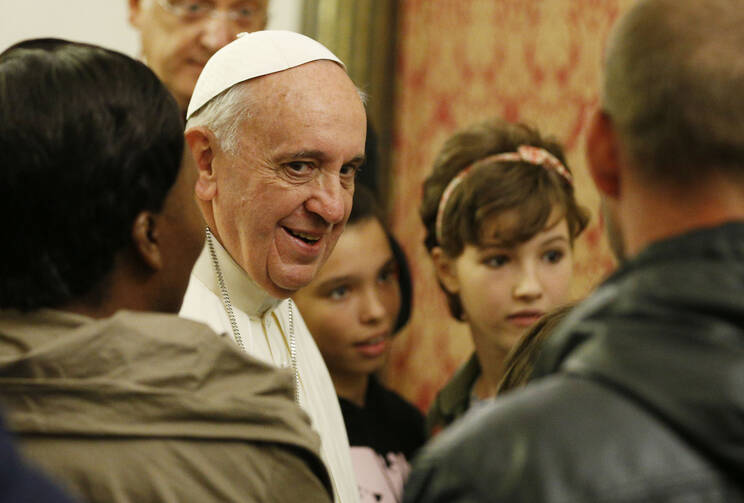Before the articles in the national newspapers, before the talk show appearances by our editors, before the debates in the blogosphere, there was the galley. The words that would receive worldwide attention from the media and would mark a milestone in Francis’ papacy first came across my desk clearly printed on a few sheets of paper, just like any other article submitted to our magazine. Upon the arrival of these pages, I immediately sat down to proofread the text. To my surprise, the mundane (and occasionally dreaded) task of proofreading soon transformed into a truly prayerful experience. As I read the interview I let it move me. I read slowly, and found myself drawing an occasional smiley face in the margins, alongside my corrections, and trying to keep an occasional tear from smearing the ink.
I was struck by the overwhelming love that underscored so much of what Pope Francis said. I was also moved by the very fact that the pope had agreed to the interview, and that he had taken care to speak with the sort of honesty and charity that encourages the larger church to do the same. His description of the church as a “home of all,” and his urging not to reduce it “to a nest protecting our mediocrity,” serves as a call for each of us to look truthfully at how well we welcome others, and how much we think of ourselves.
Francis’ pastoral nature is clear, his desire to see people first—“individual persons, one at a time.” He is, it seems, intent on making sure we know that his role, the role of the papacy, is not one in which he directs an anonymous church from on high, but one that allows him to journey alongside each of us toward Christ. He will not let us forget that he is one of us, a sinner. Nor will he let us forget that we, along with him, are redeemed through God’s mercy.
Yet this mercy, Francis reminds us, is not simply a grace requested in supplication and passively received. It is a motivating force, furthering the work of our church. “[T]he ministers of the church must be ministers of mercy above all,” Francis said. This is not a request from which we can opt out. Mercy, in Francis’ church, calls us, allows us, requires us, to become better. And it is a call to all people of good will. But how should we begin? How do we accompany others in mercy, a quality difficult to define and even more difficult to live authentically?
The answer, perhaps, can be found in a wonderfully invented word from Pope Francis: mercy-ing. In turning the noun into a verb, a sentiment into an action, Francis calls us not only to have mercy or to show mercy, but to embody mercy. The word emphasizes the active element of mercy, as a force that binds us, compels us, and enables us to love one another more fully.
This call for mercy-ing is at once a call for humility and a call to greatness. It pushes us to live out the extraordinary Gospel message, to acknowledge the dignity of our fellow travelers on this journey, and the reality of our own faults. It is a call to look toward Christ and then look inward before we respond to others. It is a call to allow ourselves to be moved, to proceed deliberately, with compassion alongside our corrections. In short, mercy-ing is a call to listen to one another with love. It allows us to realize the power of words, clearly and lovingly spoken. And of the Word, humbly lived.








